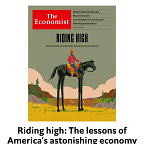I recently posted about the Economist as a contra. I highlighted how the front cover of the Economist often marks peaks and bottoms in various economic and financial cycles. Hence the recent front cover on the success of the American economy was somewhat concerning.
What I should highlight is that the Economist is, despite its “contra” status, a very good “newspaper” (I think of it as a magazine, but for regulatory purposes it insists that it is a newspaper). I have been reading the Economist since I was 16. My mother was always keen on her children reading well, and there were always copies of the Economist, the now defunct Bulletin and Far East Economic Review (FEER) lying around. The Bulletin was sort of like an Australian focused Economist, but with more Kal style cartoons, while the FEER was an excellent publication, and far better at covering Asia than the Economist, but sadly no longer with us. For Japanese readers, I was a big fan of Toyo Keizai 東洋経済 - but I have not read it for over 10 years, mainly due to laziness on my part.
The problem with the Economist, is that same reason it is has survived while the Bulletin and it FEER are no longer with us. The Economist knows how to sell to the biggest English reading market - America. As far as I know, US subscriber base make up 50% of all Economist subscriptions. And certainly in recent years, this domination by US subscribers has influenced the “leader” section of the Economist. As noted above, I can’t blame the Economist for pandering to its client base. In an era that has been extremely harsh for many “newspapers” and magazines, the Economist has thrived.
To get the most value from the Economist these days, I would recommend most people to read it backwards. Start with the obituary, where all sorts of interesting and inspiring people’s lives are detailed. Not all of them would be considered “good” people, but all were exceptional. One of my life’s objectives it to have my obituary in the Economist - which has actually given me two objectives in life. One is to be very interesting (I would only classify myself as interesting so far) and the second is how to fake my death for a month or so to see if I made it to the obituary. This is by far the hardest part, but I will wait until my life becomes “very interesting” before worrying too much about that. I have also realised faking my death to try and make it to the Economist obituary pages, would probably be enough to get my obituary published after I really die - but that would require faking my death twice…. Which is probably a bridge too far.
The majority of Economist readers I expect to be middle aged men (I would be delighted to be wrong about this), and so the temptation to skip the culture pages would be strong. I would strongly advise you not to do this. In my experience too many men become overly focused on business and career success, and forget that you should “work to live” not “live to work”. Reading the books, seeing the movies and going to the theatre recommended in this section will make you a better person, while reading another annual report will not.
The science and technology pages will often provide good ideas for either investing or for setting up a business. The most recent one that I read, details a new technology for cement that reduces CO2 emissions, and calls out for more research. There are also details of a listed moon launching business in Japan, that could be a huge, and finally it details efforts to reduced redundant pill consumption. Which could offer a great short selling opportunity, if there is a commonly taken pill that is largely redundant. All fantastic business ideas, yet for some reason buried in the science and technology section.
Going backwards, you then get to the finance and economics section. To be honest, while this section is better than the leader section of the Economist, it is the weakest of the back sections. If you follow the markets reasonably well, it is unlikely you will learn too much from this area, but there are the occasional nuggets.
The business section is very good. Mainly as it is largely devoid of opinion. The recent article on Chinese unicorns was fascinating, as it shows that the Chinese government rather than stifling innovation as most investors predicted after it slapped down Alibaba and Tencent, it has been able to direct more capital to the areas that China needs, namely semiconductors. And this section leads to a much more nuanced view on the China-US confrontation. The leader section would have you believe that China is stumbling under the sanctions that have been placed on it. The business section shows that China is getting its act together to replace many US technologies.
International section is relatively new, and I have found hit and miss so far, so will not pass comment.
You then get to countries section. The order of this section depends on where you are reading the Economist. I have the UK version, which writes about the UK first, then Europe, followed by the US, Middle East and Africa, America, Asia and then finally China. If you are actually interested in where the world is going, then this is probably exactly backwards. What is even more infuriating about this order is that very few people need to know “more” about the UK, Europe and the US. These are the most extensively covered news markets in the world. People need to know more about where China, India, Asia, Middle East and Africa are going, and these are the areas where the the Economist adds most value, but of course has the least number of subscribers.
Recently the Economist has had added “By Invitation” section, which I usually skip, as I don’t need more opinions in my life. The letters section I read religiously, not because I usually learn that much, but mainly for amusement factor as various people write into say how much the Economist is wrong on some subject. My brother, curse him, once a got a letter published. (This is one reason I need to get my obituary into the Economist so I can outdo him. The Economist once wondered why Australia’s best selling magazine, Women’s Weekly, was only published monthly. My brother wrote a letter pointing out that it used to be a weekly publication, but when it changed to a monthly publication, even Australian publishers blanched at the idea of calling a magazine “Women’s Monthly”. My various efforts at getting a letter published in the Economist have totally failed).
And the finally you get to the leaders. Typically once you have read the title, you know exactly what the rest of the article is going to say. Is Keir Starmer Ready For Office? Probably. The West Should Supply Ukraine With F-16s. Agreed. The Power And Limits Of The US Dollar. Boring. You get the idea.
To be fair to the Economist, I still read it every week, even as I have given up on other newspapers and magazines like the FT, The Sydney Morning Hearld, Private Eye and GQ. More power to it. And hopefully my advice to read it backwards will help boost its subscription base - and maybe even get the leader section to be improved. I live in hope and hopefully die in the obituary section.











